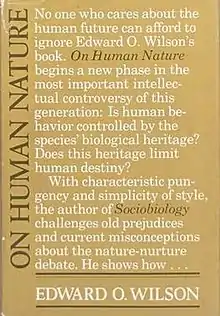On Human Nature
On Human Nature (1978; second edition 2004) is a book by the biologist E. O. Wilson, in which the author attempts to explain human nature and society through sociobiology. Wilson argues that evolution has left its traces on characteristics such as generosity, self-sacrifice, worship and the use of sex for pleasure, and proposes a sociobiological explanation of homosexuality.[1] He attempts to complete the Darwinian revolution by bringing biological thought into social sciences and humanities. Wilson describes On Human Nature as a sequel to his earlier books The Insect Societies (1971) and Sociobiology: The New Synthesis (1975).
 Cover of the first edition | |
| Author | E. O. Wilson |
|---|---|
| Country | United States |
| Language | English |
| Subject | Human nature |
| Publisher | Harvard University Press |
Publication date | 1978 |
| Media type | Print (Hardcover and Paperback) |
| Pages | 288 |
| ISBN | 0-674-01638-6 |
| OCLC | 55534964 |
| 304.5 22 | |
| LC Class | GN365.9 .W54 2004 |
The book won the Pulitzer Prize in 1979.
Summary
Wilson writes that On Human Nature is the third of a trilogy, the previous volumes of which were The Insect Societies (1971) and Sociobiology: The New Synthesis (1975), and that its thesis is that general sociobiology, "the extension of population biology and evolutionary theory to social organization", is the appropriate means of closing "the famous gap between the two cultures". He proposes that homosexuality may be "a distinctive beneficent behavior that evolved as an important element of early human social organization", describing it as "above all a form of bonding", possibly based on a genetic predisposition.[2]
Reception
The biologist Jerry Coyne accused Wilson of trying to use evolutionary psychology to control social science and social policy in The New Republic, arguing that On Human Nature was similar in this respect to Wilson's subsequent book Consilience (1998) and to the biologist Randy Thornhill and the anthropologist Craig Palmer's A Natural History of Rape (2000).[3]
Bryan Walsh in 2011 named On Human Nature as one of the "100 best and most influential" books written in English since 1923 in Time. He considered Wilson's "real achievement" to be to "show how a sociobiological view of humanity could still have grandeur."[4] The computer scientist Paul Brown in 2018 stated in Skeptical Inquirer that On Human Nature is "still brimful with ideas and insights about who we are, how we got here, and how to get wherever we want to go."[5]
On Human Nature was discussed by Gregory Hanlon in the Journal of Interdisciplinary History. Hanlon credited Wilson with helping to establish that human behavior could not be understood solely in terms of "learned cultural values", that the behavioral sciences could help to explain "the interpersonal actions in past societies." He compared the book to the ethnologist Irenäus Eibl-Eibesfeldt's Human Ethology (1989) and the historian Daniel Lord Smail's Deep History and the Brain (2008).[6]
The anthropologist Sarah Blaffer Hrdy argued that a reading of On Human Nature refutes the accusation that Wilson aims to use sociobiology to reinforce traditional sex roles.[7] The philosopher Roger Scruton criticized Wilson's sociobiological explanations of human social behavior, arguing that because of Wilson's "polemical purpose" he was forced to oversimplify the facts. However, he granted that sociobiological explanations of the sort favored by Wilson might possibly be correct.[8] The anthropologist Donald E. Brown commented that he at first failed to read Wilson's book because his views were still conditioned by the "sociocultural perspectives" in which he had been trained. However, Brown concluded that "sociobiologists might be more convincing if they confined their explanations to universals rather than attempting to show that virtually everything that humans do somehow maximizes their reproductive success."[9]
Science writers John Gribbin and Mary Gribbin described On Human Nature as an "accessible account of the application of sociobiology to people".[10] The sociologist Ullica Segerstråle described On Human Nature as essentially a development of Wilson's earlier ideas. She commented that, unlike opponents of sociobiology, Wilson saw it as having liberal political implications, and tried to develop these suggestions in On Human Nature.[11] The psychologist David P. Barash and Ilona A. Barash called On Human Nature, "A wide-ranging, thoughtful, and controversial classic of human sociobiology".[12]
On Human Nature won a 1979 Pulitzer Prize.[4]
References
- Wilson 1995, p. 143.
- Wilson 1995, pp. ix–x, 143–144.
- Coyne 2000, pp. 27–34.
- Walsh 2011.
- Brown 2018, pp. 58-59.
- Hanlon 2009, pp. 1–31.
- Hrdy 1981, p. 200.
- Scruton 1994, pp. 185–186, 403.
- Brown 1991, p. viii.
- Gribbin & Gribbin 1993, p. 286.
- Segerstråle 2000, pp. 157, 377.
- Barash & Barash 2001, p. 362.
Bibliography
- Books
- Barash, David P.; Barash, Ilona A. (2001). The Mammal in the Mirror: Understanding Our Place in the Natural World. New York: W. H. Freeman and Company. ISBN 0-7167-4166-0.
- Brown, Donald E. (1991). Human Universals. New York: McGraw-Hill, Inc. ISBN 0-07-008209-X.
- Gribbin, Mary; Gribbin, John (1993). Being Human: Putting People in an Evolutionary Perspective. London: J. M. Dent. ISBN 0-460-86164-6.
- Hrdy, Sarah Blaffer (1981). The Woman That Never Evolved. Cambridge, Massachusetts: Harvard University Press. ISBN 0-674-95541-2.
- Scruton, Roger (1994). Sexual Desire: A Philosophical Investigation. London: Phoenix. ISBN 1-85799-100-1.
- Segerstråle, Ullica (2000). Defenders of the Truth: The battle for science in the sociobiology debate and beyond. Oxford: Oxford University Press. ISBN 0-19-850505-1.
- Wilson, Edward O. (1995). On Human Nature. London: Penguin Books. ISBN 0-14-024535-9.
- Journals
- Brown, Paul (2018). "The Fortieth Anniversary of E.O. Wilson's On Human Nature". Skeptical Inquirer. 42 (3).
- Coyne, Jerry (2000). "Of Vice and Men". The New Republic. 222 (14).
- Hanlon, Gregory (2009). "The Facts of Life in Rural Counter-Reformation". Journal of Interdisciplinary History. 40 (1). – via EBSCO's Academic Search Complete (subscription required)
- Online articles
- Walsh, Bryan (August 17, 2011). "All-TIME 100 Nonfiction Books". Time. Retrieved November 14, 2016.